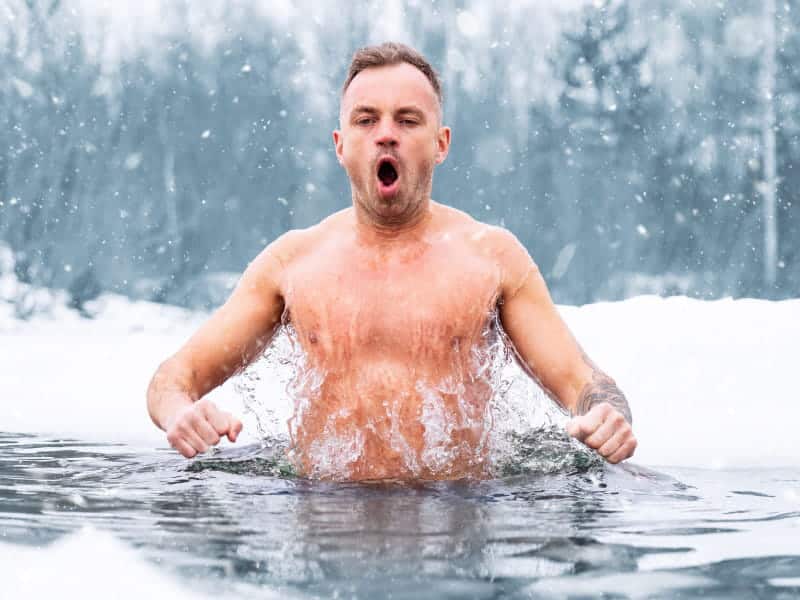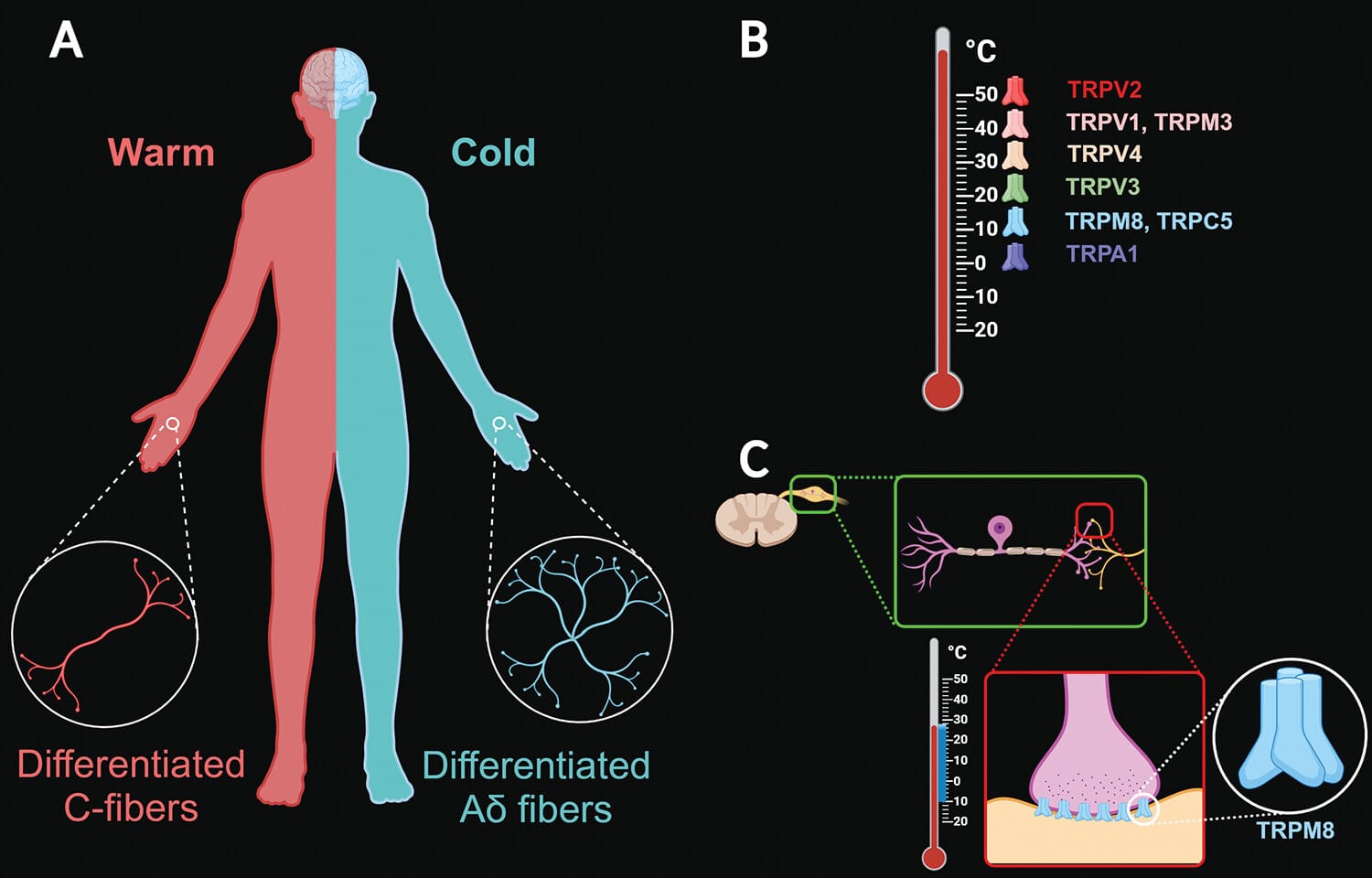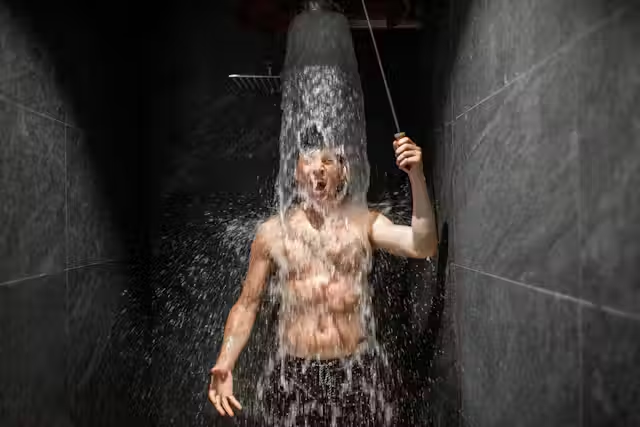Introduction
The benefits of cold water have played an important role in maintaining physical and mental health throughout history. From cold showers in traditional medicine to ice baths in professional sports, exposing the body to cold water has always been an intriguing and debated topic. But what exactly happens inside us when the body comes into contact with cold water? This article provides a comprehensive review of the scientific benefits of cold water and the body’s reactions—from the moment of exposure to its long-term effects.

The Body’s Reaction at the Moment of Contact with Cold Water
Cold Shock Response
As soon as the body comes into contact with cold water, a reaction called the “cold shock response” occurs, which includes the following:
A rapid increase in heart rate
Vasoconstriction (constriction of blood vessels)
A sudden increase in breathing rate, which may even lead to hyperventilation.
🔬 Scientific Study: According to a study published in the Journal of Physiology, the cold shock response begins within 20 seconds of entering water below 15°C and typically peaks within 1 to 3 minutes. \[Tipton et al., 1991]
Short-Term Benefits of Cold Water Exposure
1. Improved blood circulation
With the constriction of surface blood vessels and the redirection of blood to vital organs, blood flow in the central parts of the body increases. After exiting the cold water, the vessels dilate again, improving peripheral circulation.
2. Activation of the sympathetic nervous system
Cold water is a powerful stimulant for the sympathetic nervous system. It triggers the release of norepinephrine, leading to increased alertness, mental focus, and a feeling of energy.
3. Reduction of muscle inflammation
Ice baths or cold water immersion are among the most popular methods in sports for muscle recovery after intense exercise. This approach reduces inflammation and accelerates muscle tissue repair.
Long-Term Effects of Regular Cold Water Exposure
1. Strengthening the immune system
Studies have shown that individuals who regularly take cold showers experience fewer colds. This effect is related to increased white blood cell production and regulation of immune system activity.
2. Improved mood and reduced symptoms of depression
Cold water, by stimulating nerve endings in the skin, triggers the release of endorphins and dopamine. These natural chemicals play a key role in improving mood.
3. Increased metabolism and support for weight loss
Exposure to cold activates brown adipose tissue (brown fat) in the body, which burns energy instead of storing it. This process helps improve metabolism.
Cold Shower vs. Ice Bath: Differences and Uses
|
Features |
Cold Shower |
Ice Bath |
|---|---|---|
|
Temperature |
Usually 10–15 degrees Celsius |
Usually 0–10 degrees Celsius |
|
Duration |
2 to 5 minutes |
5 to 15 minutes |
|
Purpose |
Nerve stimulation and increased energy |
Muscle recovery and inflammation reduction |
|
Daily use |
Yes |
No, only under specific conditions. |
Benefits of Cold Water
1. The effect of cold water on brain function and cognitive improvement
When the body comes into contact with cold water, the brain is simultaneously stimulated. One immediate brain response to this condition is the increased release of neurotransmitters such as norepinephrine and dopamine, which directly influence focus, memory, motivation, and cognitive performance. Studies have shown that short-term exposure to cold water increases activity in brain regions associated with alertness, awareness, and concentration.
Specifically, norepinephrine, which is released during acute stress, plays a crucial role in enhancing alertness and mental processing speed. This effect can be beneficial for students, employees, and individuals working in high-stress environments.
This is why many entrepreneurs, executives, and successful individuals worldwide consider daily cold water exposure a part of their morning routine.

2. Benefits of Cold Water for Skin and Hair: Natural Beauty Without Cost
In addition to its internal effects, contact with cold water offers remarkable benefits for skin and hair. Unlike warm water, which can strip the skin’s natural oils and cause dryness, cold water tightens open pores and helps retain the skin’s natural moisture and oils. This process prevents the entry of dirt, bacteria, and microbes into the skin, reducing acne and inflammation.
For hair, cold water causes the cuticles (the outer layer of the hair) to close, giving the hair a shinier appearance. It also helps reduce hair breakage and increases its strength.
✔️ Practical Tip: If you finish your face washing or shampooing routine with a final rinse of cold water, your skin and hair will become shinier, healthier, and more resilient.
These effects have made cold water a cheap, simple, and side-effect-free solution for maintaining the beauty and health of skin and hair.
3. The Impact of Cold Water on Better Sleep and Nighttime Rest Quality
Although cold showers are usually recommended for waking up and boosting morning energy, controlled exposure to cold water in the evening can also help improve sleep quality. This effect is due to cold water’s influence on regulating core body temperature and lowering cortisol levels, the stress hormone.
Lowering body temperature is a key signal for initiating the sleep process. Taking a cold shower or brief exposure to cold water in the evening reduces body temperature, helping the body enter the rest phase more quickly. Additionally, stimulation of the parasympathetic nervous system in this condition promotes relaxation and prepares the body for deeper sleep.
So, if you struggle with insomnia or have light, restless sleep, incorporating cold water exposure into your nighttime routine might be transformative for you.
4. Thermal Adaptation: How the Body Adjusts to Cold Water
Regular exposure to cold water can lead to thermal adaptation in the body. This adaptation means an improved ability of the body to manage sudden temperature changes and is a characteristic of individuals who regularly face cold exposure, such as athletes or those practicing the “Wim Hof Method.”
In this state, the body learns how to better manage thermal shock and optimally regulate physiological responses such as shivering, vasoconstriction, and increased heart rate. This process involves the resetting of the hypothalamus, the brain’s temperature control center.
Thermal adaptation can lead to:
Reduced discomfort in cold environments
Increased capacity to tolerate physical and mental stress
Strengthening of the immune and metabolic systems
This adaptation is not only beneficial for general health but also essential for mountaineers, open-water swimmers, and people living in cold regions.
5. The Connection Between Cold Water, Mindfulness, and Mental Health
Sudden exposure of the body to cold water forces you to be fully present in the moment. This is exactly the concept emphasized in positive psychology and mindfulness practices, as the mind, upon entering cold water, cannot dwell on past thoughts or future worries but becomes completely focused on the present.
In fact, cold water exposure can act as a form of “forced meditation.” In response to the cold shock, the body alters its breathing rhythm, and if you manage to control your breath at that moment, you are effectively practicing a form of mental control and nervous system relaxation.
Therefore, cold water is not only a physiological tool but also a psychological one for stress relief and focusing on the present moment.
6. Differences in Men’s and Women’s Reactions to Cold Water Exposure
Scientific research has shown that men and women do not respond to cold exposure in exactly the same way. These differences arise due to variations in body composition, subcutaneous fat levels, and hormonal function between the sexes. Generally, women have more subcutaneous fat, which acts as a natural thermal insulator, but they tend to be more sensitive to cold compared to men.
Studies indicate that under similar conditions, women tend to shiver more and their core body temperature drops faster, while men generate more heat in their muscles. Additionally, women may respond differently to cold water exposure during menstruation or pregnancy.
As a result, although cold water exposure benefits everyone, its use should be planned according to individual characteristics, including gender and physical condition.

7. Comparison of the Benefits of Cold Water, Sauna, High-Intensity Exercise, and Fasting
Interestingly, cold water exposure is one of several natural methods to stimulate metabolism and enhance body performance. But how does it compare with other approaches such as sauna, HIIT (high-intensity interval training), or intermittent fasting?
|
Method |
Mechanism of action |
Shared benefits |
|---|---|---|
|
Cold water |
Norepinephrine stimulation and brown fat activation |
Improved metabolism and reduced inflammation |
|
Sauna |
Heat shock, increased blood flow |
Detoxification and cardiovascular health |
|
HIIT Exercise |
Intense physical stress, high oxygen consumption |
Fat burning and increased aerobic capacity |
|
Fasting |
Calorie restriction and insulin regulation |
Cellular repair and fat burning |
Each of these methods has its own specific effects, but interestingly, combining them (for example, sauna + cold water or fasting + cold shower) can produce synergistic effects.
🔍 Note: Methods like “Contrast Therapy” combine sauna and ice baths and are very popular among professional athletes for recovery.
Possible Side Effects and Safety Considerations
While many benefits of cold water have been noted, its potential side effects in some individuals should not be overlooked:
Risk of cardiac arrest: in individuals with heart disease
Hypothermia: from prolonged exposure to very cold water
Asthma attacks: in susceptible individuals
🔍 Important Note: Always consult your doctor before starting regular cold showers or baths, especially if you have any underlying health conditions.
Tips for Gradually Starting Cold Water Exposure
If you are a beginner, start with these steps:
Finish your warm shower with 15 to 30 seconds of cold water.
Gradually increase the duration of cold water exposure.
Use proper breathing techniques to manage the initial shock.
Immediately after a cold shower, dry your body and keep warm.
Conclusion
Exposure to cold water not only activates profound physiological processes but, when practiced regularly, can have beneficial effects on physical health, mental well-being, and athletic performance. However, as its scientific benefits are extensive, observing safety precautions and consulting a medical professional are also essential.
References
Tipton, M. J., The Journal of Physiology, 1991
A study on the initial human body responses to cold water immersion:
Available on PubMed
PDF version in Journal of Applied PhysiologyHuttunen, P. et al., International Journal of Circumpolar Health, 2000
A study on the effects of winter swimming on general health:
Available on PubMed
PDF version at Taylor & FrancisBleakley, C. M., Sports Medicine, 2012
A review of the effects of cold water immersion on delayed onset muscle soreness after exercise:
Available on PubMed
Full text available in the Cochrane LibraryBuijze, G. A. et al., PLoS One, 2016
The impact of cold showers on health and work performance:
Available on PLOS ONE
Version available on PubMedShevchuk, N. A., Medical Hypotheses, 2008
A proposal for treating depression using cold showers:
Available on ScienceDirect
Version available on PubMedCypess, A. M. et al., New England Journal of Medicine, 2009
Identification and significance of brown adipose tissue in adults:
Available in NEJM
Version available on PubMedKox, M. et al., Proceedings of the National Academy of Sciences, 2014
Voluntary activation of the sympathetic nervous system and attenuation of the innate immune response in humans:
Available on PNAS
Version available on ResearchGate
Pelank Life | Body Health Assessment
The Best Body Health Calculators Using Scientific Methods
Developed by Pelank Life ©